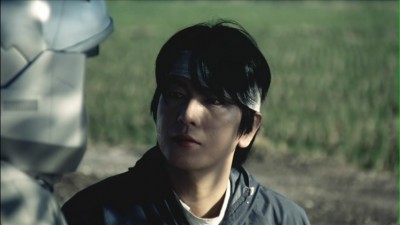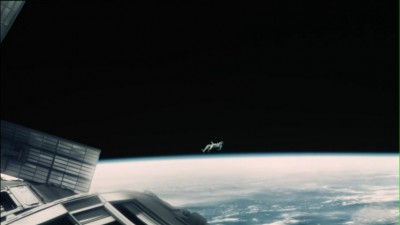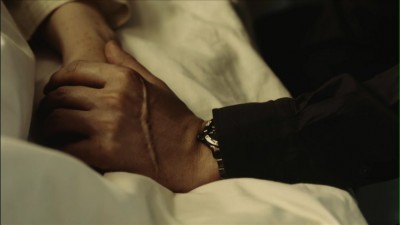| Reviews & Columns |
|
Reviews DVD TV on DVD Blu-ray 4K UHD International DVDs In Theaters Reviews by Studio Video Games Features Collector Series DVDs Easter Egg Database Interviews DVD Talk Radio Feature Articles Columns Anime Talk DVD Savant Horror DVDs The M.O.D. Squad Art House HD Talk Silent DVD
|
DVD Talk Forum |
|
|
| Resources |
|
DVD Price Search Customer Service #'s RCE Info Links |
|
Columns
|
|
|
Clone Returns Home, The
In move of being half-joking, half-serious, AnimEigo's release of "The Clone Returns Home" sports a notice in the section usually reserved for warnings of nudity, language, or violence. It reads, "WARNING: Contains Significant Amounts of Philosophy." Released in early 2009 in it's native Japan, the film is just now reaching shores, unfortunately on the heels of a 2009 sci-fi film that I won't name for fear of spoiling both films. I mention this only because on the surface "The Clone Returns Home" will draw comparisons to that film, despite the similarities only being surface. Written and directed by Kanji Nakajima, "The Clone Returns Home" was a film I approached with heavy bias, coming off viewing Nakajima's two short films "Fe" and "The Box" a day or two prior. My view on Nakajima was one of a pretentious filmmaker who had a very distinct vision of incorporating sci-fi elements into image rich and nearly dialogue free productions.

Thankfully, "The Clone Returns Home" justifies Nakajima's potential as a feature filmmaker and allows the director to flesh out his philosophical (they weren't lying on the cover) approach to storytelling. There is a two-fold joy to the film, which is the rare exception to modern in sci-fi, in that it uses advanced technology only as a plot device to examine the very nature of existence as well as the mind's handling of grief. Set in a mildly advanced future, "The Clone Returns Home" follows Kohei Takahara (Mitsuhiro Oikawa), an astronaut who volunteers his mind for backup by government scientists for implantation into a clone, should he perish on a mission outside or small world. Naturally, Kohei perishes, launching the film's second act drawing on an incredibly touching flashback to early childhood, particularly one solitary event that has left Kohei grief-stricken into adulthood and in turn, causing a "glitch" in his cloned state. In the most basic of terms, the new Kohei has completely regressed to that tragic moment of boyhood.

Nakajima pulls the rug from under viewers in the second act, turning the straightforward tale into a nearly dialogue free examination into the meaning of a soul. It's here that lead Oikawa's brilliant performance rivals the film's almost heartbreakingly simple and beautifully cinematography as Oikawa is forced to take on two (eventually three) distinct roles. The average viewer, not emotionally invested by the first act revelation is likely to checkout completely and it's a risky gamble Nakajima takes, one that almost perfectly pays off, it wasn't for the crutch of two government scientists essentially explaining plot devices that will later be important in understanding the philosophical intent of the picture. Likewise, Nakajima's slow pace becomes a tad self-indulgent, with long nearly silent shots of the titular journey. It's not quite (the original) "Solaris" slow, but does ultimately withhold the film from ever being considered perfect.

Those willing to invest themselves completely for the 110-minute journey, should be left with questions about the nature of a soul, even if their religious beliefs (or lack thereof) already have clearly defined definitions of the concept. Nakajima makes a sincerely earnest effort to never pander to the average viewer nor the philosophical snob who will endlessly try and dissect an initially difficult but eloquently simplistic tapestry of themes. The bigger issues I had with the film were minor plot elements, that upon a second viewing (something I feel is required, another noteworthy flaw) become almost embarrassingly simple if not obvious. As a whole however, "The Clone Returns Home" is a more than handsomely made, intelligent sci-fi drama that pushes traditional boundaries of storytelling and is by and large made possible by a lead performance from Mitsuhiro Oikawa that will go down in the records books as criminally underrated. Do not fear what this movie has to offer.
THE DVD
The Video
The 1.85:1 anamorphic widescreen transfer is nearly reference quality, capturing the artistically eye-pleasing cinematography of a modern world only sparsely garnished with future technology. Colors are vibrant, striking, and lifelike, while detail is always above average to excellent. Only a few darker sequences keep this from being a perfect transfer with a hint of too much grain/noise and a lack of true definition of shadowed objects and backgrounds. Even if you don't care for the film's tone, visually you will not be let down.
The Audio
The Dolby Digital Japanese stereo audio track is a little underwhelming which is sad for a film that has a few sound reliant scenes. A tremendously quiet film, I had to turn the dial up on my sound system so much to get a decent experience, that when I went to check out the "Making Of" featurette later on, I was nearly knocked over by how high I had set things. Dialogue is clear and crisp, and even at an understandable setting can be pushed to the back by the film's natural effects track and thematically fitting, often rich sounding musical score. English subtitles are provided in either Yellow or White, with a distinction in color made when multiple characters are talking via Green, Red or shades of Grey. The subtitles also contain a few cultural translations, a feature I've found standard on AnimeEigo DVDs and always appreciate.
The Extras
In the bonus features section of the disc, a subtitled, 50-minute "Making Of" featurette sheds some light on the production of the film. Text based biographies of the principal crew and lead actor, as well as a few pages of production notes provide an interesting tidbit, that Mitsuhiro Oikawa's performance was dialed down and introspective at the request of the director specifically because Oikawa is known to Japanese audiences as a musical performer who is often compared to David Bowie in his theatrics. The film's original trailer and a gallery of images from the film round things out.
Final Thoughts
It is both sad an understandable that "The Clone Returns Home" is winding up as a straight-to-DVD entry into the US market. Kanji Nakajima's sci-fi drama is a breath of fresh air from a narrative standpoint as well as visually and would be a sight to behold on the big screen. Thankfully the DVD presentation is nearly perfect, initial audio quirks aside, allowing viewers to experience the tale of human nature through Mitsuhiro Oikawa's multi-faceted, "triple" role from the comfort of their home. A film sincerely close to being a perfect genre entry, "The Clone Returns Home" is an early contender for the best film of 2011, despite its low-key release. Highly Recommended.
|
| Popular Reviews |
| Sponsored Links |
|
|
| Sponsored Links |
|
|
| Release List | Reviews | Shop | Newsletter | Forum | DVD Giveaways | Blu-Ray | Advertise |
|
Copyright 2024 DVDTalk.com All Rights Reserved. Legal Info, Privacy Policy, Terms of Use,
Manage Preferences,
Your Privacy Choices | |||||||














